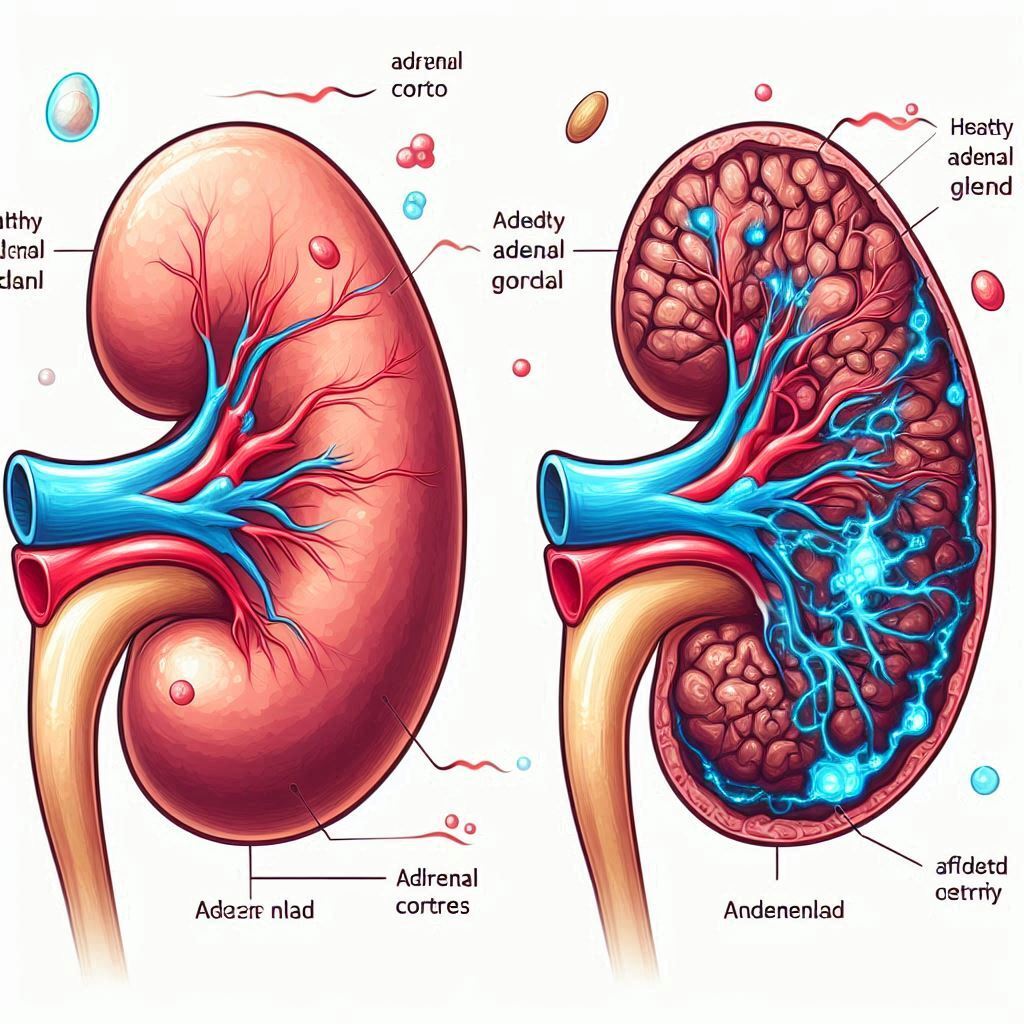Overview
Addison’s disease is a rare, chronic condition where the adrenal glands do not produce enough hormones cortisol and aldosterone. It is primarily caused by an autoimmune attack and is treatable with medication.
What is Addison’s Disease?
Addison’s disease occurs when the adrenal glands, located atop the kidneys, do not produce enough cortisol and aldosterone. These hormones are crucial for various bodily functions, including:
| Hormone | Function |
|---|---|
| Cortisol | Manages stress responses, blood pressure, heart function, and immune response. |
| Aldosterone | Regulates sodium and potassium balance, affecting blood volume and pressure. |
Types of Adrenal Insufficiency
- Primary Adrenal Insufficiency (Addison’s Disease)
- Secondary Adrenal Insufficiency: Caused by insufficient adrenocorticotropic hormone (ACTH) from the pituitary gland.
Who is Affected?
- Most common in individuals aged 30 to 50.
- Higher risk in those with autoimmune polyendocrine syndrome or other autoimmune diseases such as Type I diabetes, Graves’ disease, and vitiligo.
Prevalence
- Affects approximately 1 in 100,000 people in the U.S.
Symptoms and Causes
Symptoms
Symptoms develop gradually and may include:
| Symptom | Description |
|---|---|
| Fatigue | Constant tiredness |
| Hyperpigmentation | Dark patches on skin |
| Abdominal Pain | Discomfort in the stomach area |
| Nausea/Vomiting | Gastrointestinal distress |
| Diarrhea | Frequent loose stools |
| Weight Loss | Unintentional decrease in body weight |
| Muscle/Joint Pain | Discomfort or pain in muscles/joints |
| Dehydration | Insufficient fluid in the body |
| Low Blood Pressure | Dizziness upon standing |
| Mood Changes | Irritability, depression |
| Salt Cravings | Desire for salty foods |
| Low Blood Sugar | Hypoglycemia symptoms |
Addisonian Crisis
A life-threatening condition characterized by:
- Extreme weakness
- Severe abdominal pain
- Confusion or mental changes
- Severe vomiting and diarrhea
- Low blood pressure
Seek emergency medical attention if experiencing these symptoms.
Causes
- Autoimmune Attack: Most common cause (75% of cases).
- Infections: Such as tuberculosis (common in developing countries).
- Other Causes: Include cancer, adrenal hemorrhage, and amyloidosis.
Diagnosis and Tests
How is Addison’s Disease Diagnosed?
Diagnosis may involve several steps:
- Blood Tests: Check levels of sodium, potassium, cortisol, and ACTH.
- ACTH Stimulation Test: Measures adrenal response to synthetic ACTH.
- Insulin-Induced Hypoglycemia Test: Assesses pituitary gland function.
- CT Scan: Visualizes adrenal glands for damage or infection.
Management and Treatment
How is Addison’s Disease Treated?
- Hormone Replacement Therapy:
- Cortisol: Usually with hydrocortisone.
- Aldosterone: Typically with fludrocortisone.
Note: Lifelong medication is necessary, with dosage adjustments during stressful events.
Prevention
Can Addison’s Disease be Prevented?
Currently, there is no known way to prevent Addison’s disease.
Outlook / Prognosis
What is the Prognosis for Addison’s Disease?
- Generally good with treatment; individuals can lead normal lives.
- Ongoing monitoring is essential to avoid complications like obesity or hypertension.
Living With Addison’s Disease
Self-Care Tips
- Carry an identification card and wear a medical alert bracelet.
- Consult healthcare providers about medication adjustments during illness or stress.
- Keep emergency cortisol shots available and ensure others know how to administer them.
When to See a Healthcare Provider
- Regular check-ups are crucial for medication management.
- Contact your provider during major stress events or if experiencing symptoms of an addisonian crisis.




